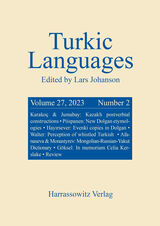Autor: Peter Sauli Piispanen
- «
- 1
- »
Die Suche erzielte 4 Treffer.
Re-etymologizing Russian cultural vocabulary in Yukaghir as mediated by the Yakut article
Additional Turkic and Tungusic borrowings into Yukaghir article
Extensive borrowing of reindeer terminology in north-eastern Siberia article
- «
- 1
- »
